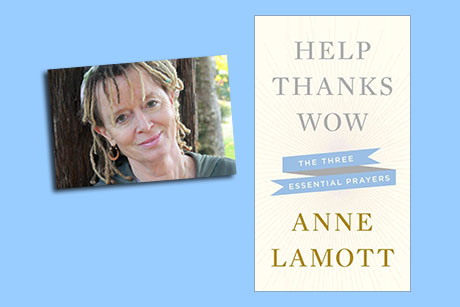This is another book review post in a series we’re calling “You Should Read This.” Check out Jason’s first post here.
Does your prayer life need a kickstart? If so, you may feel encouraged and inspired as you read Anne Lamott’s recent book Help, Thanks, Wow: The Three Essential Prayers (New York: Penguin, 2012). It is a book for everyone. It doesn’t get bogged down in academic jargon but is an easy-to-read, realistic and insightful reflection on the three basic prayers. If you are familiar with Lamott’s other books, you won’t be surprised by her irreverent take on Christian prayer. But her writing is honest and thought-provoking, and if you are like me, you will find that her perspective helps you think about your own prayer life and the ups and downs of communicating your deepest needs and experiences with God (however you name Him/Her/It). I even thought about using it in my class for first-year students, and even though I’ve now decided to recommend instead of require it, I will give it an enthusiastic endorsement in the classroom.
Lamott begins by defining prayer as “communication from the heart to that which surpasses understanding.” The best prayers are the prayers that communicate what’s really going on with us/in us/around us to God/Higher Power/Goodness/Howard (to understand this last title, you’ll need to read the book’s Prelude). As she writes:
My belief is that when you’re telling the truth, you’re close to God. If you say to God, “I am exhausted and depressed beyond words, and I don’t like You at all right now, and I recoil from most people who believe in You,” that might be the most honest thing you’ve ever said. If you told me you had said to God, “It is all hopeless, and I don’t have a clue if You exist, but I could use a hand,” it would almost bring tears to my eyes, tears of pride in you, for the courage it takes to get real–really real. It would make me want to sit next to you at the dinner table. [Kindle Location 92]
So prayer requires honesty with God. But of course that involves honesty with ourselves. And what are my true desires, my deepest needs? What is going on in my fast-paced life anyway? As Lamott continues, she explains that truth-telling is difficult in the inner life in part because it involves paying attention to what is going on in your life and how you are interpreting/processing/handling it. In that sense, prayer is not just about talking to God but about walking with God. Lamott’s book has a three-part structure, in which she reflects in more detail on each of the three different kinds of prayer: Help (petition), Thanks (expressions of gratitude), and Wow (expressions of awe and wonder).
1. Help
We say this prayer when we realize we need God, or God-sized patience, or a hug. We realize we can’t do everything all by ourselves.
We say, “Help.”
We say, Help, this is really all too much, or I am going slowly crazy, or I can’t do this, or I can’t stop doing this, or I can’t feel anything. Or, Help, he is going to leave me, or I have no life, or I hate the one I’ve created, or I forgot to have a life, or I forgot to pay attention as it scrolled by. Or even, Help, I hate her so much, and one of my parents is dying–or will never die. Unfortunately, we haven’t even gotten to the big-ticket items yet: cancer, financial ruin, lost children, incontinence. [Kindle Location 252]
These prayers tell God what is really going on with us. They remind us that we are not in charge, but that we trust in God in the midst of it. These prayers remind us that we are not alone, even if we feel that way. It is in this section of the book that Lamott shares a prayer strategy called the “God box.” You use a container (lunch box, shoe box, whatever you have handy), and you write a note to God. It can be the name of a person who is on your mind, or a special prayer request. It is pretty basic. You just ask God for Help. Lamott explains that this strategy works. But what does that mean? It isn’t magic. It doesn’t mean that you hear a deep voice and the box goes “poof” and your friend’s cancer is cured. No, that’s not what it is all about. We don’t know what will happen, but we have shared our angst with God. Lamott says, “Maybe after you put a note in the God box, you’ll go a little limp, and in that divine limpness you’ll be able to breathe again. Then you’re halfway home.”
2. Thanks
The second kind of basic prayer is one of gratitude. Lamott says the long version reads “Thankyouthankyouthankyouthankyou” but we can just shorten it to “thanks.” We say this prayer to acknowledge the big and little things for which we are grateful. We name the joy in prayer and share it with God.
So I say “Thanks,” because revelation has shown me things that are miserable that somehow I may get to sidestep; or that are miserable but that prayer and friends help me find a way through; or that are painful and beautiful in ways that make your heart ache, that draw you closer forever to the comrades who have walked with you.
Without revelation and reframing, life can seem like an endless desert of danger with scratchy sand in your shoes, and yet if we remember or are reminded to pay attention, we find so many sources of hidden water, so many bits and chips and washes of color, in a weed or the gravel or a sunrise. There are so many ways to sweep the sand off our feet. So we say, “Oh my God. Thanks.” [Kindle Location 427]
3. Wow
The third kind of prayer expresses awe. It takes us out of ourselves.
“Wow” means we are not dulled to wonder. We click into being fully present when we’re stunned into that gasp, by the sight of a birth, or images of the World Trade Center towers falling, or the experience of being in a fjord, at dawn, for the first time. “Wow” is about having one’s mind blown by the mesmerizing or the miraculous: the veins in a leaf, birdsong, volcanoes. [Kindle Location 546]
What experiences today made me stop and say “Wow”? Lamott describes theologians and poets who have puts words to her feelings of awe. She encounters beauty in film, art, prose. Her descriptions of wonder and mystery draw us in, and show us that sometimes the miracle that makes us say “wow” is that we have the courage to forgive or that we have come to accept our aging body, or that we watch the sunset and can only think kind thoughts. We pray for deeper faith, for a heart attuned to the presence of God.
Lamott writes, “I pray for the change in perception that will let me see bigger and sweeter realities.” The wow-moments can come in different kinds of packages, but the thing that links them together is that they draw us towards the big-ness of Life/Love/Mystery/God. They recharge our batteries, reshape our perception, rearrange our insides. In a good way.
—–
This is not a book focused on communal prayer, and even though Lamott has written in earlier books about the strong community in her church and the friendships that sustain her there, that is not the focus of this book. You won’t find anything here on liturgy or lectio divina or structured retreats. This is not that kind of book. But it doesn’t need to be. This is a book about communicating the ups and downs of your life with God, and her wit and humor will draw you in and help you think about your own prayers in a new way. Or, at least, that’s what happened to me. Enjoy!



